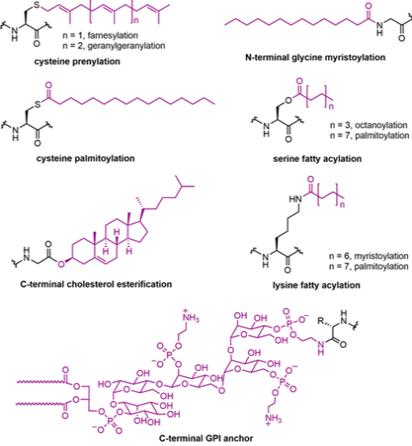Lipidation Analysis Service
Protein lipidation, a form of acylated post-translational modification, surpasses glycosylation in diversity due to the varied structures and properties of lipids. At Creative Proteomics, we specialize in delivering top-notch lipidation analysis services, which encompass the identification, quantification, and characterization, offering valuable insights for your protein research endeavors.
What is Lipidation
Protein lipidation is a versatile post-translational modification where lipids are covalently attached to proteins, influencing their localization, structure, and function within cells. This modification serves as a regulatory mechanism, playing pivotal roles in signal transduction, membrane association, and various cellular processes.

Fig.1 Schematic of Lipidation (Reily, C.; et al., 2019)
There are several types of protein lipidation, including myristoylation, palmitoylation, prenylation, and glycosylphosphatidylinositol (GPI) anchoring. Myristoylation involves the addition of a myristoyl group, usually a 14-carbon fatty acid, to the N-terminal glycine of a protein. Palmitoylation entails the attachment of palmitate, a 16-carbon fatty acid, to cysteine residues, often reversible and dynamically regulating protein-membrane interactions. Prenylation involves the addition of isoprenoid groups (farnesyl or geranylgeranyl) to cysteine residues, influencing membrane association and cellular signaling. GPI anchoring employs a glycolipid anchor to attach proteins to the cell membrane, offering a distinct mode of membrane association.
Applications of Lipidation Analysis
- Cellular Process Research
Protein lipidation has broad implications for cellular physiology and pathology. It regulates the subcellular localization of proteins, impacting processes such as signal transduction, vesicular trafficking, and immune response. - Disease Research
Dysregulation of lipidation is associated with various diseases, including cancer, neurodegenerative disorders, and infectious diseases. Understanding the principles of protein lipidation is essential for unraveling the molecular mechanisms underlying these conditions and for developing targeted therapeutic interventions. - Drug Development
Lipidated proteins are crucial in biotechnology, with applications in drug development and the production of recombinant therapeutic proteins. Exploring the diverse landscape of protein lipidation opens up avenues for advancing our understanding of cellular biology and developing innovative strategies for disease treatment and prevention.
Our Service
Creative Proteomics has advanced protein detection technologies and can provide customized services to researchers and scientists to help them reveal the complexity of PTM using powerful mass spectrometry technologies. Our protein lipidation analysis services include:
Workflow of Lipidation Analysis Service

Fig.2 Lipidation analysis workflow
- Sample Preparation
Proper extraction and preparation of proteins from biological samples to ensure preservation of lipidated proteins. - Lipidation Enrichment
Enrichment techniques are employed to isolate lipidated proteins or peptides. This step is crucial as lipidation modifications are often present in low abundance compared to unmodified proteins. - Detection
LC-MS/MS is a powerful tool for identifying and quantifying lipidated peptides, providing sequence information that helps to identify lipidation sites. - Bioinformatics Analysis
Advanced bioinformatics tools are used to analyze data, identify lipidated peptides, and map these modifications to protein sequences. - Result Delivery
After professional data analysis, we deliver results quickly and consistently.
Creative Proteomics brings a wealth of experience to the field of protein research. Our comprehensive services and products cover the entire spectrum of utilizing suitable and efficient gateways. Utilizing our proprietary platform, we have successfully implemented many proteomics research projects. If you are interested, please contact us for more information and a quote.
Reference
- Reily, C.; et al. Lipidation in health and disease. Nature Reviews Nephrology. 2019, 15(6): 346-366

